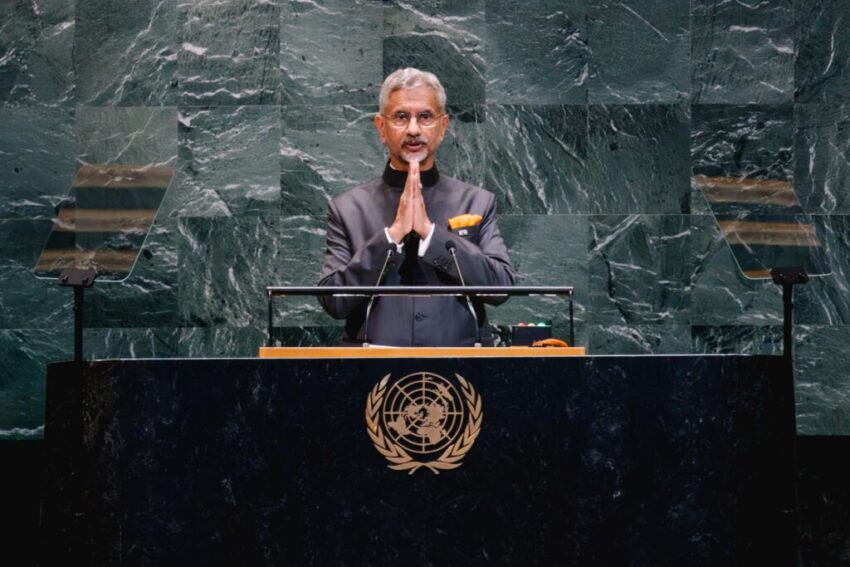
In a speech that took several swipes at Pakistan without naming that country, demanded global action against terrorism, and pointed fingers at emerging unfair trade regimes, India’s External Affairs Minister S. Jaishankar drove home the need for reorganizing the international body with a view to meeting new challenges.
New Delhi has for years, made the case for permanent membership in the UN Security Council, and did so again, albeit obliquely, indicating it was ready for taking on more responsibility.
“An objective report card will show that the UN is in a state of crisis. When peace is under threat from conflicts, when development is derailed by lack of resources, when human rights are violated by terrorism, the UN remains gridlocked. As its ability to forge common ground diminishes, belief in multilateralism also recedes,” Jaishankar said.
Central to the erosion of UN’s credibility has been resistance to reform, he said, saying it was imperative to purposefully address the reform agenda.
“The historical injustice done to Africa should be redressed. Both permanent and non-permanent membership of the Council must be expanded. A reformed Council must be truly representative. And India stands ready to assume greater responsibilities,” said Jaishankar, a point New Delhi has been making for many years, and being stymied by members like China in the Security Council, who hold veto powers.
India approach to the contemporary world is guided by three key concepts, Jaishankar said, Atmanirbharta or self-reliance, Atmaraksha or national security, and Atmavishwas or self-confidence.
National security means “zero-tolerance for terrorism, robust defense of our borders, forging partnerships beyond and assisting our community abroad,” Jaishankar told the 80th session of the UN General Assembly, Sept. 27, 2025.
“As the most populous nation, as a civilizational state, as a rapidly growing major economy, we are confident about who we are, and what we will be. Bharat will always maintain its freedom of choice. And will always be a voice of the Global South,” Jaishankar pledged.

Mincing no words, Jaishankar challenged the world body: “We must ask ourselves today: how has the UN lived up to expectations?” Pointing to Ukraine and Middle East as flashpoints, the slow progress in achieving Sustainable Development Goals Agenda 20230, which “presents a sorry picture,” he went further, without naming the United States, pointed to Washington as the source where climate action itself is being questioned.
The Covid pandemic exposed the discrimination in access to vaccines and to travel; energy and food security have been casualties of this discrimination; and countries have “gamed rules and regimes” in the area of trade”, Jaishankar maintained.
“On top of that, we now see tariff volatility and uncertain market access,” he noted. All these changes require more international cooperation not less, he urged.
He slammed Islamabad without naming it, as the “epicenter” of terrorism.
“Countering terrorism is a particular priority because it synthesizes bigotry, violence, intolerance and fear,” he said, adding, “India has confronted this challenge since independence, having a neighbor that is an epicenter of global terrorism. For decades now, major international terrorist attacks are traced back to that one country. UN’s designated lists of terrorists are replete with its nationals,” Jaishankar pointed out.
He reminded the audience of the most recent example of cross-border barbarism — the murder of innocent tourists in Pahalgam in April this year. He called for “much deeper” international cooperation against terrorism.
“When nations openly declare terrorism as state policy, when terror hubs operate on an industrial scale, when terrorists are publicly glorified, then such actions must be unequivocally condemned,” he declared. “The financing of terrorism must be choked, even as prominent terrorists are sanctioned. Relentless pressure must be applied on the entire terrorism eco-system. Those who condone nations that sponsor terror will find that it comes back to bite them.”
India was doing its part to make the world a better place, Jaishankar contended. “That is why we have undertaken more than 600 major development projects in 78 countries, as well as innumerable community-based initiatives. They range from large infrastructure to small livelihoods, from capacity building to people’s welfare, from concrete assets to education and training.”
Whether it is finance, food, fertilizer or fuel, India has responded to the urgent requirements of its neighbors, and been a ‘First Responder’ when essential medicines or relief supplies were needed; built field hospitals in 19 nations last year, assisted Afghanistan and Myanmar during recent earthquakes.
He went into some detail describing India’s storied history in UN Peacekeeping Operations which continue in the Democratic Republic of Congo, in Western Sahara, Central African Republic, Golan Heights, Cyprus, Lebanon, Abyei, South Sudan and Somalia.
“To put it clearly: our soldiers ensure peacekeeping, our sailors protect maritime shipping, our security counters terrorism, our doctors and teachers facilitate human development the world over, our industry produces affordable products, our techies promote digitization and our training facilities are open to the world. These remain the core of our foreign policy,” Jaishankar said.
On resolving the Ukraine conflict, he said, “Nations who can engage all sides must step-up in the search for solutions. India calls for an end to hostilities and will support any initiative that will help restore peace.”



